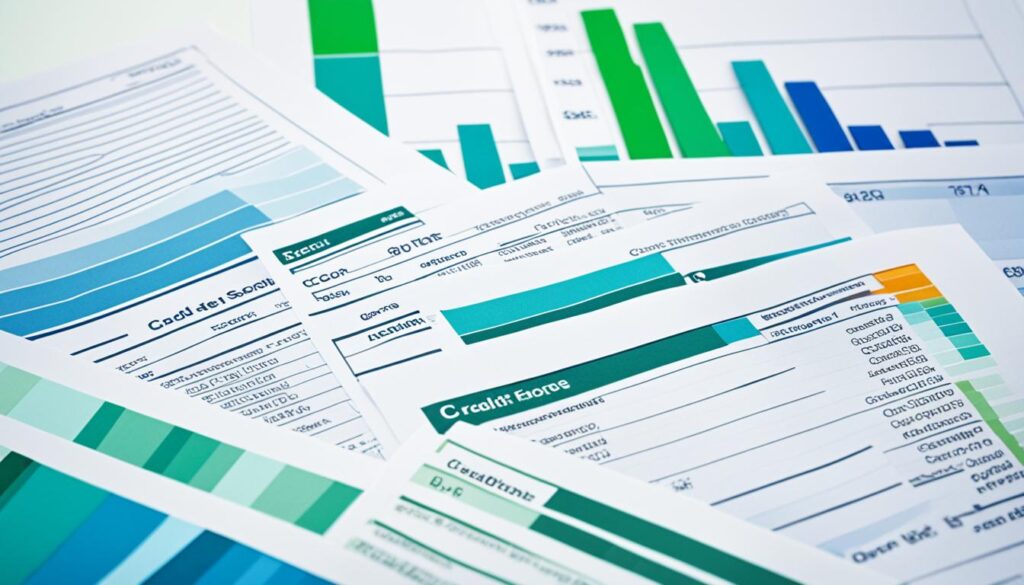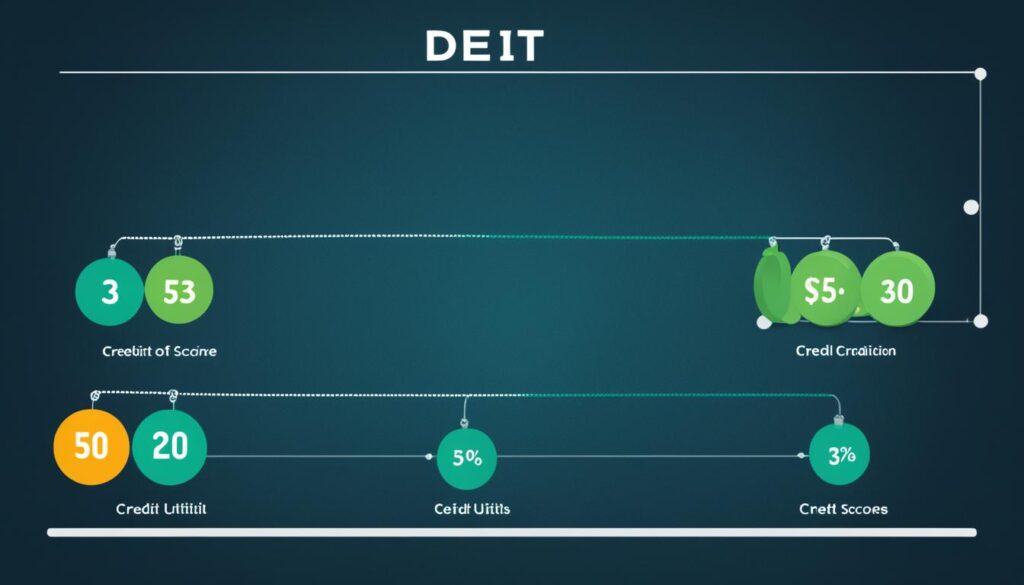Improving your credit score is not only essential for financial health but also for your future financial endeavors. Let me share a story that many of us can relate to:
Meet Sarah, a hardworking professional who had dreams of buying her own home. However, when she applied for a mortgage, she was shocked to learn that her credit score was lower than she expected. Sarah realized that her personal debt was holding her back.
Determined to turn things around, Sarah embarked on a journey of debt repayment and personal debt management. She researched various debt payoff strategies and explored options for improving her credit health.
Sarah discovered that by consolidating her debts, she could simplify her payment schedule and potentially save on interest charges. She also learned about credit repair tips and how to create a debt management plan that worked for her lifestyle.
With each payment made, Sarah could see her credit score gradually improve. It was a testament to her commitment to financial responsibility and her efforts to maximize her credit score.
Today, Sarah has not only cleared her debts but has also achieved her dream of buying her own home. The journey was challenging, but she ultimately triumphed over her financial obstacles.
Are you ready to take control of your credit scores and work towards financial stability like Sarah did? In this article, we will explore the steps you can take to improve your credit score and pave the way for a brighter financial future.
Key Takeaways:
- Improving your credit score is essential for financial health and future financial endeavors.
- Consolidating your debts can simplify payment schedules and potentially save on interest charges.
- Explore credit repair tips and create a debt management plan to suit your lifestyle.
- Commit to financial responsibility and maximize your credit score.
- Take control of your credit scores and work towards financial stability.
Why Does a Good Credit Score Matter?
A good credit score is vital for maintaining your financial health and achieving long-term financial stability. It showcases your ability to responsibly manage debt, which is crucial in today’s credit-driven society. Lenders and financial institutions use your credit score to assess your creditworthiness and make decisions regarding loan approvals and interest rates. A good credit score opens doors to various opportunities and benefits, while a poor credit score can limit your options and hinder your financial progress.
When lenders review credit applications, they analyze credit scores to determine the level of risk associated with lending money to an individual. Higher credit scores indicate lower-risk borrowers who are more likely to repay their debts on time. As a result, individuals with good credit scores enjoy a higher chance of loan and credit approval. They also have access to lower interest rates, which means less money paid toward interest over the life of a loan. This financial advantage can save them significant amounts of money in the long run.
A good credit score not only affects loan approval and interest rates but can also have an impact on other areas of your life. Insurance companies use credit scores to calculate insurance scores, which help determine the premiums you’ll pay for auto, home, or life insurance. Individuals with good credit scores are often considered lower-risk policyholders and are more likely to receive favorable insurance rates.
Furthermore, your credit score can influence your ability to secure rental housing or rent a car. Landlords and rental agencies often run credit checks as part of their application process to assess the likelihood of timely rent payments. Similarly, car rental companies may require a credit check to ensure that you can be trusted with their vehicles.
Ultimately, a good credit score is a reflection of your responsible credit use and payment history. It demonstrates to lenders and financial institutions that you are a trustworthy borrower who can be relied upon to fulfill financial obligations. By maintaining a good credit score, you can enjoy the benefits of lower interest rates, increased access to credit, and greater financial flexibility. It is an essential aspect of achieving and maintaining financial well-being.
Steps to Build Good Credit
Building good credit takes time and effort. By following these steps, you can improve your credit score and take control of your financial future:
- Review your credit reports regularly to identify any errors or discrepancies that may be impacting your credit score.
- Make timely and consistent bill payments to demonstrate your financial responsibility and establish a positive payment history.
- Manage your credit utilization by keeping your balances low in relation to your credit limits. Aim to utilize less than 30% of your available credit.
- Avoid opening too many new credit requests within a short period, as this can indicate a greater risk of overextending your credit.
- If you have a thin credit file with limited credit history, consider opening a secured credit card or becoming an authorized user on someone else’s account to start building credit.
- Address any delinquencies or late payments promptly, as they can negatively impact your credit score. Set up reminders or automated payments to ensure timely bill payments.
- Consider debt consolidation options if you have multiple high-interest debts, as consolidating your debts into one loan can simplify payments and potentially lower interest rates.
- Monitor your credit regularly with credit monitoring services to stay informed about any changes to your credit score or potential fraudulent activity.
Remember, building good credit is a gradual process, and it’s important to practice responsible financial habits and make informed credit decisions. By taking these steps, you can improve your credit score and lay the foundation for a healthy financial future.
| Benefits of Building Good Credit |
|---|
| Increased likelihood of loan approvals |
| Access to lower interest rates |
| Opportunity for higher credit limits |
| Better insurance rates |
| Improved financial stability and flexibility |
Review Your Credit Reports
Before you can work on improving your credit score, it’s crucial to review your credit reports. Your credit reports contain essential information about your credit history and play a significant role in determining your creditworthiness. By understanding the factors that contribute to your credit score, you can take targeted actions to improve it.

When reviewing your credit reports, look for the following key factors:
- On-time payments: Timely payment of your credit obligations is a crucial factor in credit score calculation. Ensure that all your lenders have reported your payments accurately and that there are no missed or late payments on your record.
- Low balances: Maintaining low balances on your credit accounts demonstrates responsible credit usage. Aim to keep your credit card balances below 30% of your available credit limit to maximize your credit score.
- Credit mix: Having a healthy mix of credit accounts, such as credit cards, loans, and mortgages, can positively impact your credit score. It shows that you can handle different types of credit responsibly.
- Inquiries: Excessive credit inquiries within a short period can indicate increased credit risk. Limit unnecessary credit applications to prevent any negative impact on your credit score.
In addition to these factors, it’s crucial to check for any errors or inaccuracies in your credit reports. Mistakes in reporting can have a significant impact on your credit score. If you find any errors, promptly dispute them with the respective credit bureaus to have them corrected.
Remember, you’re entitled to a free copy of your credit reports from each of the major credit bureaus once a year. Take advantage of this opportunity to review your reports for accuracy and identify areas for improvement.
Regularly monitoring your credit is also essential to stay informed about any changes or discrepancies. Consider utilizing free credit monitoring services to receive alerts about any significant credit score changes or potential fraudulent activities.
Get a Handle on Bill Payments
Payment history plays a critical role in determining your credit score. It reflects your ability to manage your debts and make timely payments, which is essential for improving your overall credit health. Late payments can have a significant negative impact on your credit score, so it’s crucial to develop a strategy for staying on top of your bills.
One effective approach is to set up reminders for your bill due dates. Whether it’s through a smartphone app, a calendar notification, or a reminder service provided by your bank, having timely reminders can help you avoid missing payments and ensure that you maintain a positive payment history.
Automating your bill payments can also be extremely helpful. Many financial institutions offer the option to set up automatic payments, where your bills are paid directly from your bank account. This way, you no longer have to worry about forgetting due dates or risking late payments. Just make sure you have sufficient funds in your account to cover the bill payments.
Another strategy to consider is charging your bills to a credit card and paying the balance in full each month. By doing so, you establish a history of on-time payments for your credit card account, which positively impacts your credit score. However, be sure to pay attention to your credit utilization ratio, which is the amount of credit you are using compared to your credit limit. Keeping your credit utilization ratio low, ideally below 30%, is beneficial for your credit score.
Remember that consistent, on-time payments are key to maintaining a positive payment history and improving your credit score. By getting a handle on your bill payments through reminders, automation, and strategic credit card payments, you can demonstrate financial responsibility and boost your creditworthiness.
Aim for 30% Credit Utilization or Less
Credit utilization ratio refers to the percentage of your available credit that you are currently using. It is a crucial factor that affects your credit score. To maintain a healthy credit utilization ratio and improve your credit score, aim to keep your credit card balances below 30% of your available credit limit.
When your credit card balances are high and close to your credit limit, it suggests that you may be relying too heavily on credit and may have difficulty managing your debt. This can negatively impact your credit score.
Lowering your credit card balances can help improve your credit utilization ratio and demonstrate responsible credit management. By paying down your balances, you reduce the amount of credit you are utilizing. This, in turn, can positively impact your credit score.
Additionally, consider requesting a credit limit increase from your credit card issuer. Increasing your credit limit while maintaining low balances can further reduce your credit utilization ratio. However, it’s important to note that this strategy only works if you can resist the temptation to increase your spending with a higher credit limit.
To avoid exceeding your desired credit utilization percentage, take advantage of your credit card’s high balance alert feature. This allows you to set a threshold at which you receive notifications when your balance approaches a certain limit. It helps you stay conscious of your credit utilization and manage it effectively.

Paying Off Credit Debt Strategically
Paying off credit debt strategically is an important step towards improving your credit score and achieving financial stability. By strategically managing your debts, you can optimize your credit utilization, reduce high-interest rate debts, and demonstrate responsible repayment behavior. Here are some key strategies to consider:
Focusing on High-Interest Rate Debts
Start by prioritizing the repayment of high-interest rate debts. These debts accrue more interest over time, increasing the overall amount you owe. By tackling them first, you can reduce the risk of accumulating more debt and save money in interest charges.
Targeting Credit Cards with Lowest Credit Limits
Another strategic approach is to pay off credit cards with the lowest credit limits. Doing so can improve your credit utilization ratio, which measures the amount of available credit you’re using. A lower credit utilization ratio is generally better for your credit score, so paying down these cards can have a positive impact.
Considering the Impact on Debt Mix
When paying off different types of debts, such as credit cards and student loans, it’s essential to consider the impact on your debt mix. Lenders typically prefer to see a healthy mix of installment loans, like student loans, and revolving credit, like credit cards. Paying off a student loan may reduce your debt mix diversity, potentially impacting your credit score.
Demonstrating Commitment to Repaying Debts
Paying off past-due bills is another strategic move that can improve your credit score. It shows lenders that you’re committed to repaying your debts and can help rebuild trust. Address any outstanding bills promptly to avoid further damage to your credit health.
By implementing these debt payoff strategies, you can strategically manage your debts and improve your credit score over time. It’s important to stay disciplined and make consistent payments to demonstrate your commitment to responsible credit management.
How Can Debt Repayment Maximize Scores and How Do Debt Relief Programs Work in the US?
Debt repayment is crucial for maximizing credit scores. Utilizing debt relief programs in US can help negotiate lower interest rates and consolidate debts for more manageable payments. These programs work by providing financial counseling and negotiating with creditors to lower overall debt amounts.
How can students maximize their credit scores while repaying debt?
Students can maximize their credit scores while repaying debt by implementing effective student debt repayment strategies. Making payments on time, avoiding taking on additional debt, and exploring options for loan forgiveness can all contribute to achieving a higher credit score and reducing overall debt burden.
Conclusion
Maximizing your credit scores through effective debt repayment is crucial for achieving financial stability and improving your credit health. By implementing responsible credit management strategies, such as reviewing credit reports regularly, making timely bill payments, managing credit utilization, and strategically paying off debt, you can gradually improve your creditworthiness.
Building good credit requires dedication and discipline, but the long-term benefits are significant. By taking control of your debts and following these proven strategies, you can enhance your credit health and open doors to better financial opportunities.
Remember, improving your creditworthiness takes time, but it is a worthwhile effort. By prioritizing debt repayment and adopting responsible credit management practices, you can improve your credit scores, increase your financial stability, and create a solid foundation for your future financial success.
FAQ
Why is a good credit score important?
A good credit score is important because it demonstrates your ability to manage debt responsibly. Lenders view individuals with higher scores as lower-risk borrowers who are more likely to repay their debts on time. With a good credit score, you can enjoy benefits such as easier loan approval and access to lower interest rates. Additionally, a poor credit score can impact your ability to find rental housing, rent a car, and even get life insurance.
How can I improve my credit score?
Improving your credit score takes time and effort. Some steps you can take include reviewing your credit reports, making timely bill payments, managing your credit utilization, paying off debts strategically, and monitoring your credit score regularly.
Why is it important to review my credit reports?
Reviewing your credit reports is important because it allows you to assess the factors that contribute to your credit score. You can look for positive factors such as on-time payments, low balances, a mix of credit accounts, and minimal inquiries. It’s also important to check for any errors or negative factors that could be dragging your score down. You’re entitled to a free copy of your credit reports once a year, and it’s essential to monitor your credit regularly to check for any changes and discrepancies.
How can I stay organized with my bill payments?
To stay organized with your bill payments, consider using reminders or automating payments. Set up a system that works for you to ensure you make your payments on time. Paying your bills on time demonstrates financial responsibility and positively impacts your credit score. You can also consider charging your bills to a credit card and paying the balance in full each month to establish a history of on-time payments.
How can I improve my credit utilization ratio?
To improve your credit utilization ratio, aim to keep your credit card balances below 30% of your available credit limit. Paying down your balances can help reduce your credit utilization ratio and boost your credit score. You can also consider requesting a credit limit increase to further reduce your credit utilization, as long as you maintain low balances. Utilizing your credit card’s high balance alert feature can help ensure you don’t exceed your desired credit utilization percentage.
How should I pay off credit debt strategically?
When paying off credit debt strategically, focus on high-interest rate debts first to reduce the risk of accumulating more debt. Paying off credit cards with lower credit limits can improve your credit utilization ratio. It’s essential to consider the impact on your debt mix when paying off student loans, as installment loans are viewed differently than revolving credit. Additionally, paying off past-due bills demonstrates your commitment to repaying your debts. By strategically paying off different types of debts, you can improve your credit score over time.

